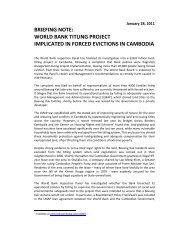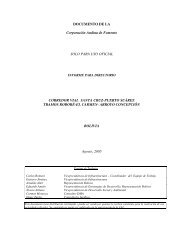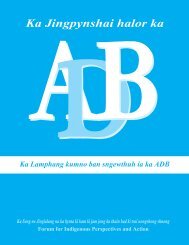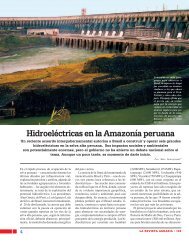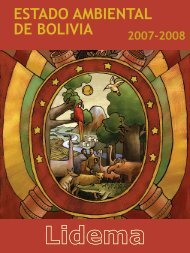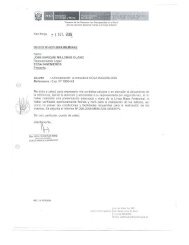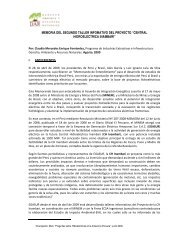The Real Cost of Power - Bank Information Center
The Real Cost of Power - Bank Information Center
The Real Cost of Power - Bank Information Center
Create successful ePaper yourself
Turn your PDF publications into a flip-book with our unique Google optimized e-Paper software.
outfall systems. In spite <strong>of</strong> these<br />
destructive intentions being mentioned<br />
in their EIA, none <strong>of</strong> the<br />
license/clearance-giving bodies took<br />
timely action!<br />
Both the creeks mentioned were<br />
dredged (as the Tatas said they would<br />
do), denuded <strong>of</strong> their rich vegetation,<br />
and turned into dead water channels.<br />
This is an irreparable loss to this rich<br />
ecology. In addition, this has badly<br />
impacted the fish availability in the<br />
region – particularly the high value<br />
lobsters, which have almost<br />
disappeared, as reported by many <strong>of</strong><br />
the local fisher-folk.<br />
Local fisher-folk pointing to the 'dredged, trained,' and denuded creek, that is<br />
now a dead water channel carrying hot and polluted cooling water out to the<br />
gulf. Fresh soil and 'rock' visible in the foreground. Fishers also pointed to the<br />
damage done to the coral reefs by dredging.<br />
“<strong>The</strong> seawater will be pumped at the end <strong>of</strong> an inlet channel connecting to Kotdi Creek. Spent cooling water,<br />
warmed to about 7 degrees Celsius (°C) above ambient sea water temperature, will be discharged back into the sea<br />
through a discharge channel opening to Mudhwa Creek. Kotdi Creek, about 3.5 km long, will be dredged and<br />
10<br />
trained to enhance its hydraulic capacity….”<br />
IV. Loss <strong>of</strong> livelihoods <strong>of</strong> fisher-folk, drastic reduction in fish catches, resulting in economic and social difficulties for<br />
fishing families – <strong>The</strong> destruction <strong>of</strong> mangroves and creeks has badly impacted the fish availability in the region –<br />
besides the high value lobsters, another economically important fish, Pomfret, has also come down drastically, as<br />
reported by fisher-folk from many villages. Even the bread and butter catch <strong>of</strong> the local fishers, the Bombay duck, is fast<br />
th<br />
declining. <strong>The</strong> fact-finding team found fisher-folk families winding up their hutments from the bunders in the 4 week <strong>of</strong><br />
April itself, instead <strong>of</strong> continuing until mid-May as is usual. Many families were found to have already left the bunders by<br />
April 24, 2012, (when the fact-finding team first visited the area), and the reason given was lack <strong>of</strong> fish catch. In Saleiha<br />
village, villagers were unanimous in telling us:<br />
“ <strong>The</strong> fish catch has greatly decreased because <strong>of</strong> the water that comes out from the TATAs and ADANIs outlet pipes.<br />
<strong>The</strong>re are no fish on the bank and we have seen a drastic decline in the last 3 years. Saleiha is a place where there used to<br />
be tonnes <strong>of</strong> lobsters and we used to be the no.1 in lobster sales. Now, the sales and catch has reduced from tonnes to<br />
kilograms. Pomfret and lobster were the specialty products <strong>of</strong> our village. <strong>The</strong> catch has reduced 75% in the last 3 years.<br />
We also find the water turbidity has increased due to the SEZ and the power plants thus the marine life is disturbed.<br />
5-6 fishermen go in a boat to fish; they fill diesel for Rs. 3,500 and roam around the sea for a day. At the end <strong>of</strong> the day<br />
we face a loss or we just manage to break even. If our lives continue to lead this way we would definitely have to run<br />
away from our villages and look out for some alternative jobs. 'Yeh Vikas nahi hai, Vinash hai!' (This is not development<br />
rather devastation <strong>of</strong> our lives).” Villagers in Saleiha, April 24, 2012.<br />
Towards the end <strong>of</strong> the meeting with the villagers, a dejected looking Fakir Abdullah Mohammad, introduced as the best<br />
fisherman <strong>of</strong> the village, walked in. He had a catch <strong>of</strong> four medium-sized Pomfrets to show for his share <strong>of</strong> the entire<br />
day's labour plus fuel and other expenses, which came to nearly INR 4,000, while the sale <strong>of</strong> these pomfrets will give him<br />
much less. Reluctant even to answer our questions, he just held his full day's catch for us to photograph, and for others<br />
to ponder – how long can this injustice last for the victims <strong>of</strong> such 'development'?<br />
And all the assembled villagers confirmed: the story <strong>of</strong> Fakir is the story <strong>of</strong> their entire community, on the brink <strong>of</strong> an<br />
unfolding disaster <strong>of</strong> someone else's making.



